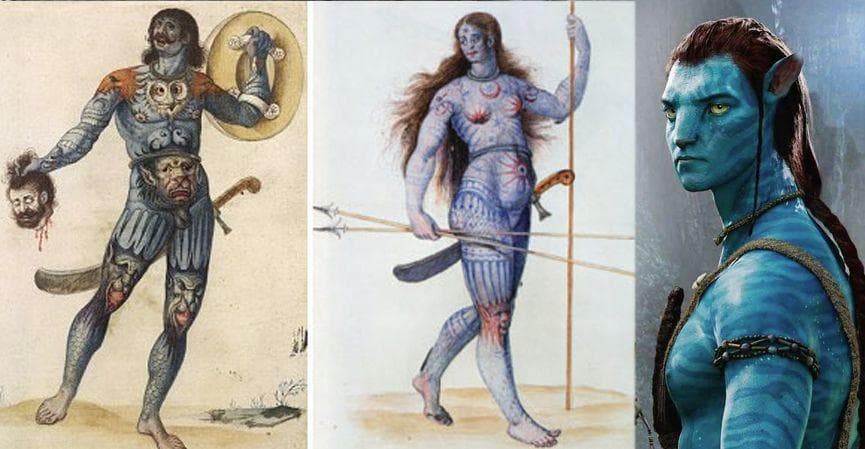Findings from a 6,500-year-old ceremonial site in northwest England, supports ancient Greek explorer Pytheas' account of Britons as "the painted people."Credit: Twitter / Oxford Archaeology
Posted on 08/31/2023 10:10:57 PM PDT by SunkenCiv
Pytheas of Massalia was the first-ever Mediterranean to reach and explore Great Britain and the Arctic Circle.
He is believed to have traveled as far as Iceland, becoming the first person on record to describe the midnight sun and the first known scientific visitor to see and describe the Celtic and Germanic tribes.According to Henry Fanshawe Tozer, Pytheas' voyage to the north took place at about 330 BC, derived from three main sources. Sadly, his original writings, titled On The Ocean, did not survive, but he is quoted in the works of later geographers, such as Strabo's Geographica, Pliny's Natural History and Diodorus of Sicily's Bibliotheca historica.
Pytheas most likely crossed the English Channel and first reached Britain from the coast of what is modern-day Cornwall, where he described the flourishing trade of tin, before he continued north along the west coasts of what are now England, Wales and Scotland.
There, he described the area's inhabitants, a Celtic-speaking people whom he called the Pretani, which would translate as "the painted ones." This could be the name that these very people called themselves, or the name in which their neighbours described them.
Despite the thousands of years between the estimated period of use of the ritual site in Carlisle where the ochre fragments were discovered, and Pytheas' voyage, previous finds in other parts of the U.K. suggest that red ochre continued to be used by prehistoric Britons until at least the Iron Age, which could bring the body painting habit closer in time to the so-called classical antiquity and Pytheas' account of the people of the Prettanike.
(Excerpt) Read more at greekreporter.com ...
Findings from a 6,500-year-old ceremonial site in northwest England, supports ancient Greek explorer Pytheas' account of Britons as "the painted people."Credit: Twitter / Oxford Archaeology
BTTT
“Sadly, his original writings, titled On The Ocean, did not survive...”
I had to look it up, but the book was destroyed in the library at Alexandria, as I suspected.
I forget the number of years folks think that fire set humanity back in terms of knowledge, inventions, etc. Looked it up - lots of disagreements. Some say 1000 years, others say not much was lost.
I did see one statement I liked.
“You know you’re a fan of history when thinking about the Great Library of Alexandria still makes you upset.”
Thanks for sending this info (you know who you are):
The Pictish Problem - Genetics of Scotland
https://www.youtube.com/watch?v=4XDS957HCIw
meanwhile:
https://freerepublic.com/tag/picts/index?tab=articles
nothin’ to do with Britain, another recently sent link:
Karahan Tepe: The Mysteries of The Oldest Known Settlement
https://www.youtube.com/watch?v=8EaKFKYPXVk
https://freerepublic.com/tag/karahantepe/index
"Tell me, O Muse, of the people of poor oral hygiene..."
Regards,
Great stuff!
Thought the Brits preferred blue body paint...
Not a huge etymological leap from “Pretani” to “Briton”

Lionel Scott, Pytheas of Massalia: texts, translation, and commentary. Routledge classical translations. Abingdon; New York: Routledge, 2022. Pp. xxii, 206. ISBN 9781032019987 $160.00. One hundred sixty smackers for a 200 page book indicates the publishers expect a sale of less than 3,000 volumes.
Just wait until they wipe out everything stored digitally.
The paperback is coming out this month for a mere $60. :^)
Pytheas’ original text did not alas survive, except as quotes in other authors. Modern commentary on it range from “it never happened” very nearly to “he discovered America”.
https://www.amazon.com/s?k=pytheas
So many assumptions implicit in the article.
Was there an English Channel back then? Or was England connected to the mainland at that time?
How much conversation was Pytheas able to actually have with the natives/locals?
And it seems like temperatures were much warmer during that time.
They don’t seem to be in a cave, grooving with several species of small furry animals.
I went down the rabbit hole about Pytheas.
Seems that his almost contemporaries (300 BC) called him a fraud. Scorned as a common person. He was perhaps driven by money to a degree (to find the tin and amber sources), but was mostly a scientific explorer. He had some device to measure latitude, and his measurements confirm where he said he was. (North-south anyway). So it might have been Iceland (which he called Thule), or it was Norway. He even got to the “congealed sea” (frozen/slush).
Pliney and others later on also referenced his work, and based on later discoveries figured Pytheas as reliable.
Yeah, he went where he said he did. His critics (living and dead) remind me of people who claim that Marco Polo never went to China because — like Jacob of Ancona and others who went overland to China and back during the Middle Ages — he didn’t mention the not-so-great Great Wall, which by that time had crumbled into ruin, particularly in the area used by the Silk Road.
Disclaimer: Opinions posted on Free Republic are those of the individual posters and do not necessarily represent the opinion of Free Republic or its management. All materials posted herein are protected by copyright law and the exemption for fair use of copyrighted works.